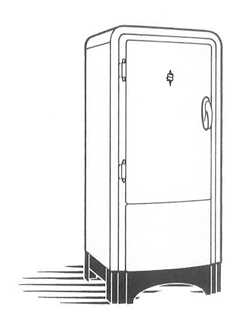
When things are running smoothly, the refrigerator is very much like some people’s idea of the perfect Zen student. It is calm, cool, and quiet, and it possesses its own inner light.
Actually, the refrigerator is quite a noble thing on its own merit. For many of us, it has a formidable presence. It offers consistency, dependability, and long-lasting service. Even when we cover it with magnets and memos, and kick and slam its doors, it allows us to enjoy many good foods that might otherwise become spoiled. When we are hungry, we go to the refrigerator. That much, we know. But do we ever give this appliance one moment’s thought during any other time of the day or night? Like many things, we take the hardworking refrigerator for granted.
Dogen once stated, “The activities within the house just move along their way, with only the furnishings of spring, autumn, winter, and summer.” The seasons of the year enhance and invigorate the places where we live. And there is one place in our home where it is eternally winter. The refrigerator has another fascinating quality: It uses heat and energy to produce coolness. The Buddhist texts on nonduality address this seeming contradiction; there is no light without darkness, no cold without heat. Just as things in the home sometimes need to be heated, they also need to be cooled, and cool temperatures are one of the mildest and most basic forms of food preservation.
For all its value, your refrigerator doesn’t need much when it comes to maintenance. You clean its handles and wipe off the outside surfaces with a damp cloth. Periodically, you clean off the coils, wipe up interior spills, and remove any contents that have become undesirable. Not much more is needed. As you do this minimal cleaning, you might think for a moment about the poet Shinkei (1406–75), who thought that nowhere in the world was there anything more beautiful than or as exquisite as ice.
Throughout Zen’s history, many writings have investigated the differences between ice and water (different forms of the same thing) or have attempted to find the place in one’s life where there is neither heat nor cold. There are many stories, also, of monks sitting zazen in the wild rain and snow outside their huts and temples. And the feeling of becoming settled, which one sometimes experiences during meditation, has itself been compared to falling snow. Another poet, Socho (fifteenth-sixteenth centuries), once likened the illuminating qualities of this type of snow to those of frozen moonlight.